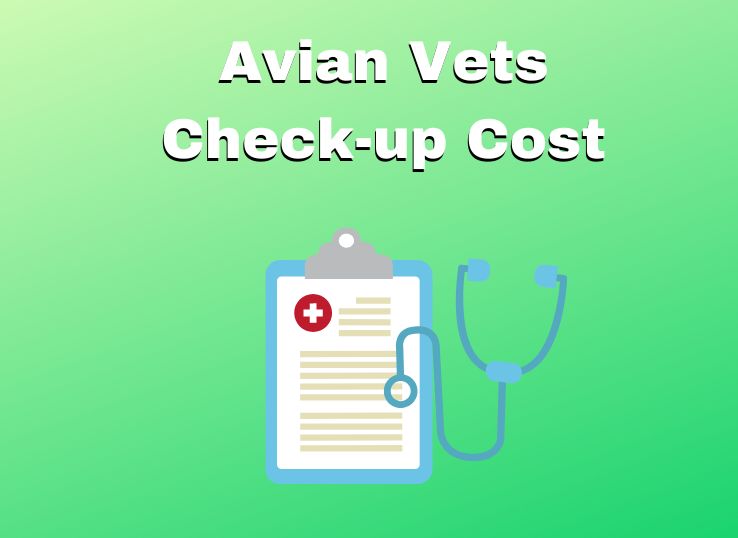Avian Vet Check-up Cost (2023)
Last Updated on March 16, 2023 by Ali Shahid
Bringing a pet bird home also comes with additional ongoing charges. One such expense is the avian vet check-up cost. Most people think that avian vets are relatively inexpensive. But this is not the case.
In 2023, the best avian veterinarians will charge $65-95 for a treatment. Among these are checking the eyes, nares, and throat, weighing the bird, trimming the claws, examining each wing, and listening to the heart and lungs.
Your veterinarian may recommend collecting throat and fecal swabs during your first visit. It is a good idea to perform these tests, as a bird that appears completely normal may still contain bacteria or other unwanted pests.
For each gram stain and each wet mount, the cost will be $8 and $10, respectively. If any information is found on the slides, it may be shown to you by the physician.
Also, the veterinarian will recommend testing for Chlamydia, which costs $25-30. You may wish to have it tested or not.
However, if required, your vet may also undergo X-rays, blood tests, and other diagnostic tests, which will increase the price. In contrast, a general check-up for birds costs in the range of 65 to 95 dollars.

Why avian check-up costs are expensive?
The symptoms of a sick dog generally give the vet a clue as to what’s ailing it. The situation is different for birds in this regard. The symptoms of different diseases in birds can be almost identical.
It is commonly known as Sick Bird Syndrome or SBS by avian vets. Typically, SBS birds are fluffed when there is no cold temperature in the room, they sleep more than usual, they eat less than usual, they are quieter than usual, etc.
It does not matter whether it is parrot fever, renal failure, or liver disease, your bird will exhibit the same symptoms. If your bird exhibits these signs, your veterinarian will tell you that it is ill. But you already know your bird is ill? Isn’t it? This is why you take your pet bird to the vet.
Thus, bird veterinarians will perform more tests to identify the root cause of the condition than veterinarians who treat dogs and cats. The cost of these tests conducted on birds is often higher than the cost of such tests conducted on dogs or cats. Specifically, why?
This is because birds differ from mammals. It’s not just the patient that’s different, but even the way the samples are collected, handled, processed, and run is different.
Since avian samples differ from those of dogs and cats, they are usually sent to specialized laboratories. For instance, just because you’ve worked with mammalian blood doesn’t mean you can handle avian blood.
In light of this, many avian veterinarians choose laboratories that specialize in exotic animals. These laboratories are generally more expensive than regular laboratories.
When a bird needs medicine while the vet waits for lab results, but isn’t sick enough to be hospitalized, the vet shows the owner how to medicate safely. A bird owner needs more time to learn how to restrain and medicate a bird than to give a dog a pill.
It is sufficient to say that this process adds 20+ minutes to an already long office visit. It is reported that most bird owners spend well over an hour with a sick bird. Therefore, if a single visit to an avian veterinarian required that much time, the cost would be high.
Some Examples of Avian Lab Tests with Charges
- Avian Necropsy Including Histo, Serology, Virology, and Bact: $190.00
- Antimicrobial susceptibility test: $29.00
- Aspergillus AGID: $20.00
- Avian Fungal Culture: $27.00
- Avian Histopathology: $75.00
- Avian Influenza H5 strain typing: $25.00
- Blood Culture: $40.00
- Blood Parasite Exam: $19.00
There are some tests an avian vet can recommend that will hike up the checkup price. So try not to shriek at your avian vet’s receptionist about the bill the next time you bring your feathered friend in.
Anyhow, that is a cheap shot – it is not the receptionist’s fault that the bill was incurred! Ideally, you should have your pet examined once a year, but you should do so more often if you suspect that your pet is ill.

